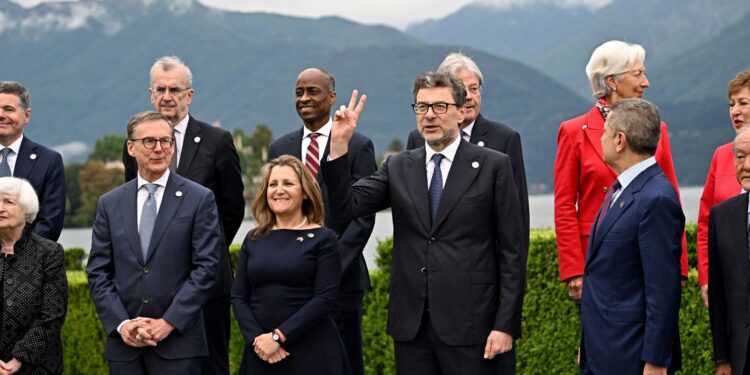Written by the editors
Recent deliberations among G7 finance ministers showed growing agreement on using Russian assets to financially support Ukraine amid its ongoing conflict. As they continue to stress their intention to tighten Western sanctions imposed on Russia against the backdrop of the Ukraine war, according to what was stated in a draft final statement.
The group’s recent meetings in Stresa, northern Italy, resulted in optimistic comments from US Treasury Secretary Janet Yellen, as Bloomberg quoted her as saying, “I feel satisfied with the talks we had,” which indicates major steps toward consensus among the group’s countries on the use of Russian assets.
The G7 finance ministers in Italy are expected today, Saturday, to lay the foundations of a preliminary agreement on using the interest on frozen Russian assets to help Kiev, but the final decision will be up to the summit of heads of state and government scheduled for mid-June.
The strategy under consideration includes launching a Western aid package that could be worth up to $50 billion to Ukraine by leveraging the interest of nearly $280 billion in Russian central bank funds, mainly held in Europe.
Legal and diplomatic challenges
Bloomberg says that G7 finance ministers are discussing not only using interest on frozen assets as a punitive measure against Russia, but also as pre-emptive support for Ukraine.
This involves the possibility of converting interest from these assets into loans to ensure continued economic support for the Ukrainian government, according to the agency.
Bloomberg indicates that this strategy is not without complexity, which involves careful study of international law to ensure that the mobilization of assets does not violate existing legal frameworks.
Implementing the plan to use Russian assets to help Ukraine poses many legal and diplomatic challenges.
Dr. Moaz Al-Amoudi, a specialist in political economy, told Al Jazeera Net that the legal precedent represents the main concern that these moves may pose, because using the frozen assets of one country to finance another country represents a transgression and a type of bullying at the level of respect for international agreements and relations, and breaks the prevailing pattern that it promotes. The Western system of economic globalization.
Although supportive, EU countries have expressed caution and called for a strong legal framework to support any decisions taken.
Al-Amoudi believes that the most important factor, given the history of economic sanctions, is that the American policy towards its opponents as a result of its control over the monetary and financial system is increasing, which means that the club of the economically punished has become a bloc that can work together.
Bloomberg reported that the G7 statement is expected to outline the broad outlines of these strategies, and reaffirm that Russian assets will remain frozen until compensation is paid for the damage to Ukraine.
Russian reaction and global repercussions
Russian President Vladimir Putin signed a decree allowing the confiscation of assets owned by US entities in Russia, as a direct countermeasure to Western sanctions and the proposed use of Russian assets to finance Ukrainian aid.
This decree signals Russia’s willingness to engage in reciprocal legal and economic measures, which could further escalate tensions.
International law expert Jean-Paul Castagno highlighted the risks associated with the G7 plans. According to Agence France-Presse, Castaño pointed out that “if Russia considers the use of proceeds from frozen assets in Europe as ‘theft’, it is very likely that it will take measures targeting Western groups that are still operating on its territory,” which means the possibility of an adverse economic reaction. It may affect not only the governments concerned, but also private entities operating within Russia.
Waiting for the G7 summit
As the date of the G7 Summit approaches in mid-June, anticipation is growing not only among the participating countries, but also throughout the global community.
Al-Amoudi points out that the escalation of these financial and legal tensions, with the increasing talk about a banking system and the ability of the Sanctioned Club to absorb developing countries with emerging economies, forces the major countries in the Sanctioned Club to make greater concessions towards enabling alternative currencies for exchange, and the success of new economic treaties and agreements that can remove power. West on it.



